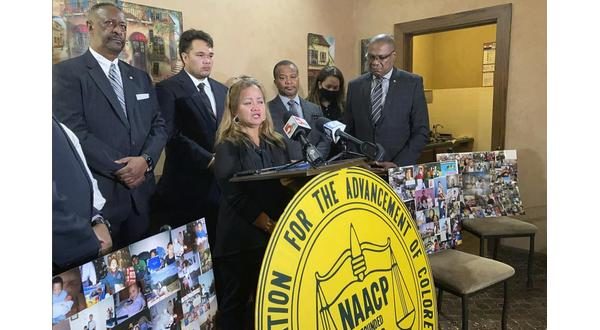
Photo — Eva Bruns speaks at a news conference in Spanish Lake, Missouri, on Nov. 11, calling for a more thorough investigation of the death of her son, 28-year-old Justin King. To the right of Bruns is Justin King’s father, John Alexander King. Justin King was shot by a white neighbor at a trailer court in Bourbon on Nov. 3. A coroner’s inquest jury on Tuesday began hearing the case involving the death of King. (AP Photo/Jim Salter File)A Black man’s death at the hands of a white neighbor in a small-town Missouri trailer park is being examined by a jury at a coroner’s inquest, a seldom-used inquiry that may — or may not — provide guidance to the prosecutor in determining if a crime was committed.
The six-member coroner’s inquest jury convened Tuesday to examine the death of Justin King in Bourbon, a town of 1,600 residents 75 miles (120 kilometers) southwest of St. Louis. It isn’t clear when the jury will announce its finding.
King, 28, was shot to death in broad daylight outside his neighbor’s home on Nov. 3. Police initially said their investigation indicated the shooting was justified, a finding questioned by some neighbors as well as civil rights leaders.
Coroner’s inquests are relatively uncommon, said Peter Joy, a professor at the Washington University School of Law in St. Louis. They’re not necessary when the cause of death is clearly not a crime, such as an auto accident, nor are they necessary when a crime was clearly committed, like many fatal shootings.
“It’s only where you have these questions, and that’s a very small number,” Joy said. “With a smaller county, you may go several years before there is a coroner’s inquest.”
The six-member jury hears testimony and weighs other evidence just as a trial jury would. The difference: Their finding carries no legal weight. Joy said the county prosecutor can factor in the jury’s decision in deciding whether to file charges; can appoint a grand jury for further investigation; or can ignore the inquest entirely.
Civil rights leaders rallied Tuesday outside the Crawford County Courthouse, prior to the inquest, demanding justice for King.
“In Missouri, whether you live here or not, the murder of Blacks is not investigated or prosecuted in the way it is for Caucasians,” Nimrod Chapel Jr., president of the Missouri State Conference of the NAACP, said in a statement.
It’s the second coroner’s inquest in six months to examine the suspicious death of a young Black man.
Derontae Martin was 19 when he died in April during a party at the Madison County home of a man with a history of making racist comments and social media postings. Investigators determined Martin killed himself, but a subsequent coroner’s inquest jury found he died by “violence,” not suicide.
One witness said at the July inquest into Martin’s death that the homeowner told him he killed Martin, saying, “he didn’t like Black people.” But another witness said he saw Martin shoot himself.
Despite the inquest jury’s determination, no charges have been filed. A phone message left with Madison County Prosecuting Attorney M. Dwight Robbins wasn’t immediately returned.
In King’s death, the Crawford County Sheriff’s Department didn’t respond to interview requests, nor did the prosecutor. But the sheriff’s department posted on Facebook soon after the shooting that “it appears that King was shot and killed after forcing entry into a neighbor’s residence where an altercation took place. The homeowner stated that he feared for his life and shot King.”
Two of King’s neighbors, in November interviews with The Associated Press, questioned the police account. They said King was a friend of the shooter, a white man in his 40s who lived across the street. Neighbor Katie Bosek said that when her car wouldn’t start around 11:30 a.m. Nov. 3, King and the shooter worked together to connect a loose wire and got the car going.
King was killed less than 15 minute later, Bosek said.
Missouri’s “castle doctrine” law allows for deadly force against intruders. Joy said that even if the shooter and King knew each other, the shooting could be deemed justified if it was determined that King was trying to break in.
WebReadyTM Powered by WireReady® NSI










